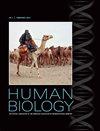Perceptions of Race and Ancestry in Teaching, Research, and Public Engagement in Biological Anthropology
4区 生物学
Q2 Medicine
引用次数: 3
Abstract
ABSTRACT The concept of race has a complex history in the field of biological anthropology. Despite increased recognition of the racist origins of the discipline, there remains little agreement about what the concept means, how it is used, or how it is discussed. This study presents the results of a survey of biological anthropologists to investigate the relationship of biological anthropologists with race and ancestry. The survey focuses on the areas of research, public engagement, and teaching as related to these concepts. Results indicate that a large majority of biological anthropologists agree that race (as a social not biological concept) is separate from ancestry. The majority of respondents agreed that ancestry categories should be based on geography (e.g., Asian, European, and African), and more anthropologists thought the terms “Hispanic” and “Latino” were inappropriate ancestry categories. While most respondents felt that discussions of these terms were not matters of “political correctness,” nearly a quarter of respondents suggested that concerns over the moral and ethical implications of research (e.g., photos, terminology, and ancestry) result in the silencing of anthropological research. Overwhelmingly, respondents felt that anthropologists have a responsibility to ensure the avoidance of misappropriation of their work by race science and by white nationalists/supremacists. Some differences in survey responses were found relating to respondents' subdiscipline, educational level, location, age, self-identified racial/ethnic categories, and gender. In regard to teaching, survey results indicate that these concepts are minimally covered in university classrooms. When taught, topics focus on the colonialist/racist history of anthropology, the presence of white privilege/supremacy, and racism. Based on the results of this survey, the authors argue for greater public engagement on these concepts, a standardized system of teaching race and ancestry, and a disciplinary conversation about practice and terminology. In this way, biological anthropologists can best place themselves to combat racism in a socially responsible way.生物人类学在教学、研究和公众参与中的种族和祖先观念
种族概念在生物人类学领域有着复杂的历史。尽管越来越多的人认识到这门学科的种族主义起源,但对于这一概念的含义、如何使用或如何讨论,人们仍然没有达成一致。这项研究提出了生物人类学家调查的结果,以调查生物人类学家与种族和祖先的关系。调查的重点是与这些概念相关的研究、公众参与和教学领域。结果表明,绝大多数生物人类学家同意种族(作为一个社会概念而不是生物学概念)与祖先是分开的。大多数受访者同意祖先类别应该基于地理(例如,亚洲人、欧洲人和非洲人),更多的人类学家认为“西班牙裔”和“拉丁裔”这两个术语是不合适的祖先类别。虽然大多数受访者认为对这些术语的讨论不是“政治正确”的问题,但近四分之一的受访者认为,对研究的道德和伦理影响(例如,照片、术语和血统)的担忧导致了人类学研究的沉默。绝大多数受访者认为,人类学家有责任确保避免种族科学和白人民族主义者/至上主义者盗用他们的工作。调查结果的差异与被调查者的分科、教育水平、地点、年龄、自我认同的种族/民族类别和性别有关。在教学方面,调查结果表明,这些概念在大学课堂上很少涉及。授课时,主题集中在人类学的殖民主义/种族主义历史,白人特权/至上主义和种族主义的存在。基于这项调查的结果,作者主张让公众更多地参与这些概念,建立一个标准化的种族和血统教学体系,并就实践和术语进行学科对话。这样一来,生物人类学家就能以一种对社会负责的方式,把自己置于对抗种族主义的最佳位置。
本文章由计算机程序翻译,如有差异,请以英文原文为准。
求助全文
约1分钟内获得全文
求助全文
来源期刊

Human Biology
生物-生物学
CiteScore
1.90
自引率
0.00%
发文量
88
审稿时长
>12 weeks
期刊介绍:
Human Biology publishes original scientific articles, brief communications, letters to the editor, and review articles on the general topic of biological anthropology. Our main focus is understanding human biological variation and human evolution through a broad range of approaches.
We encourage investigators to submit any study on human biological diversity presented from an evolutionary or adaptive perspective. Priority will be given to interdisciplinary studies that seek to better explain the interaction between cultural processes and biological processes in our evolution. Methodological papers are also encouraged. Any computational approach intended to summarize cultural variation is encouraged. Studies that are essentially descriptive or concern only a limited geographic area are acceptable only when they have a wider relevance to understanding human biological variation.
Manuscripts may cover any of the following disciplines, once the anthropological focus is apparent: human population genetics, evolutionary and genetic demography, quantitative genetics, evolutionary biology, ancient DNA studies, biological diversity interpreted in terms of adaptation (biometry, physical anthropology), and interdisciplinary research linking biological and cultural diversity (inferred from linguistic variability, ethnological diversity, archaeological evidence, etc.).
 求助内容:
求助内容: 应助结果提醒方式:
应助结果提醒方式:


